A career in web development is a dynamic and in-demand field that offers opportunities for individuals to create and maintain websites and web applications. Whether you're just starting your journey as a web developer or looking to enhance your existing skills, understanding the key requirements and aspects of this career is essential. In this comprehensive guide, we'll explore the various aspects of web development and the requirements to succeed in this field.
Table of Contents:
1. Introduction to Web Development
2. Educational Requirements
3. Core Skills
4. Web Development Specializations
5. Frameworks and Libraries
6. Web Development Tools
7. Back-End Development
8. Database Management
9. Soft Skills
10. Building a Portfolio
11. Certifications and Additional Training
12. Networking and Staying Current
13. Job Search and Career Path
14. Conclusion
1. Introduction to Web Development:
Web development is the process of creating and maintaining websites and web applications. Web developers are responsible for building the structure, design, and functionality of websites, ensuring they are user-friendly and perform well. The role of a web developer can vary from working on the visual design of a website (front-end development) to developing server-side logic and databases (back-end development).
2. Educational Requirements:
Web developers come from diverse educational backgrounds. While a formal degree in computer science or a related field can be advantageous, it is not always required. Here are some educational paths you can take:
Bachelor's Degree: Many web developers have a bachelor's degree in computer science, software engineering, or a related field. These degrees provide a strong foundation in programming, algorithms, and software development.
Online Courses and Bootcamps: Coding bootcamps and online courses have become popular choices for aspiring web developers. These programs offer focused training on practical web development skills and can be completed in a shorter time compared to traditional degrees.
3. Core Skills:
To succeed in web development, you need to master a set of core skills. These include:
HTML/CSS: Proficiency in HTML (Hypertext Markup Language) and CSS (Cascading Style Sheets) is fundamental. HTML is used for structuring web content, while CSS is used for styling it.
JavaScript: JavaScript is essential for adding interactivity to websites. You should have a strong grasp of JavaScript, including modern libraries and frameworks like React, Angular, or Vue.js.
Server-side Scripting Languages: Depending on your chosen specialization, you may need to learn server-side languages such as PHP, Python, Ruby, or Node.js.
Databases: Understanding how to work with databases is crucial. Familiarize yourself with both SQL (e.g., MySQL, PostgreSQL) and NoSQL (e.g., MongoDB) databases.
Web Development Tools: Be comfortable using version control tools like Git, text editors or integrated development environments (IDEs), and package managers like npm or yarn.
Responsive Design: Learn how to create websites that adapt to different devices and screen sizes, known as responsive design.
Web Performance Optimization: Understand techniques for optimizing web performance, including improving site speed and reducing load times.
4. Web Development Specializations:
Web development is a broad field with various specializations:
Front-End Development: Front-end developers focus on the user interface and user experience of websites. They work with HTML, CSS, and JavaScript to create the visual components and interactive elements.
Back-End Development: Back-end developers handle server-side logic, databases, and the server infrastructure. They ensure that data is processed securely and efficiently.
Full-Stack Development: Full-stack developers are proficient in both front-end and back-end development, allowing them to work on all aspects of a web application.
Specialized Roles: Some web developers specialize in areas like e-commerce, content management systems (CMS), or mobile app development.
5. Frameworks and Libraries:
Frameworks and libraries are tools that can significantly expedite web development. Familiarize yourself with popular web development frameworks and libraries, such as:
React: A JavaScript library for building user interfaces.
Angular: A comprehensive JavaScript framework for building web applications.
Vue.js: A progressive JavaScript framework for creating user interfaces.
These tools simplify the development process and are widely used in the industry.
6. Web Development Tools:
Web developers rely on various tools and software to streamline their work:
Text Editors and IDEs: Choose a text editor or integrated development environment (IDE) that suits your preferences. Popular options include Visual Studio Code, Sublime Text, and JetBrains WebStorm.
Version Control: Git is a crucial version control system for tracking changes to your code and collaborating with others. Platforms like GitHub and GitLab provide hosting for Git repositories.
Package Managers: Tools like npm (Node Package Manager) and yarn help you manage and install libraries and dependencies for your projects.
7. Back-End Development:
If you're interested in back-end development, you should explore server technologies, databases, and server-side programming languages. Common technologies and languages in this domain include:
Node.js: A runtime environment for executing JavaScript on the server side.
Ruby on Rails: A web application framework that uses the Ruby programming language.
Django: A high-level Python web framework known for its simplicity and efficiency.
Server Management: Familiarize yourself with server management tools and cloud platforms like AWS, Azure, or Google Cloud.
8. Database Management:
Databases are a fundamental aspect of web development. Learn about database management systems (DBMS) and the differences between SQL and NoSQL databases:
SQL Databases: Understand relational databases like MySQL, PostgreSQL, and Microsoft SQL Server.
NoSQL Databases: Explore non-relational databases like MongoDB, Cassandra, and Redis.
Database Query Languages: Learn SQL (Structured Query Language) for managing and querying relational databases.
9. Soft Skills:
Web developers need various soft skills to succeed in their careers, including:
Problem-Solving: Web development often involves complex problem-solving, debugging, and troubleshooting.
Communication: Effective communication is vital when working with clients, designers, and team members.
Adaptability: The field of web development evolves rapidly, so adaptability and a willingness to learn are crucial.
10. Building a Portfolio:
Creating a portfolio of web development projects is a great way to showcase your skills and experience. Your portfolio may include personal projects, freelance work, or contributions to open-source projects. A well-curated portfolio can help you stand out to potential employers or clients.
11. Certifications and Additional Training:
While not always necessary, certifications can demonstrate your expertise and dedication to potential employers. Consider certifications from organizations like CompTIA, Microsoft, or AWS to validate your skills. Additionally, pursue additional training to stay updated on the latest web development trends and technologies.
12. Networking and Staying Current:
Networking is essential in the web development community. Attend web development conferences, meetups, and online communities to connect with professionals, share knowledge, and stay informed about industry trends. Web development is a field that constantly evolves, so staying current is crucial.
13. Job Search and Career Path:
Begin your job search by applying for entry-level positions such as junior web developer, front-end developer, or back-end developer. As you gain experience, you can move into more specialized roles or positions with greater responsibilities. Consider long-term career goals, such as becoming a lead developer, architect, or starting your own web development business.
Conclusion:
A career in web development offers a world of possibilities, whether you're passionate about front-end design, back-end programming, or full-stack development. By acquiring the necessary educational background, core skills, and soft skills, building a portfolio, staying current, and networking within the web development community, you can embark on a successful and fulfilling career as a web developer. Whether you're just starting out or seeking to advance your existing career, the web development field offers numerous opportunities for growth and innovation.
Want To Become Certified Web Developer?
Join Techaedu, the premier software and website development training institute. At Techaedu, we offer cutting-edge courses and hands-on training that empower you with the skills and knowledge needed to excel in the dynamic world of software development. Our experienced instructors provide expert guidance, and our state-of-the-art facilities ensure a conducive learning environment. Whether you're a beginner or an experienced developer looking to upskill, Techaedu has the programs to help you succeed. Join us and embark on a journey to become a proficient web developer or software engineer, ready to tackle real-world projects and challenges with confidence.





Leave a reply